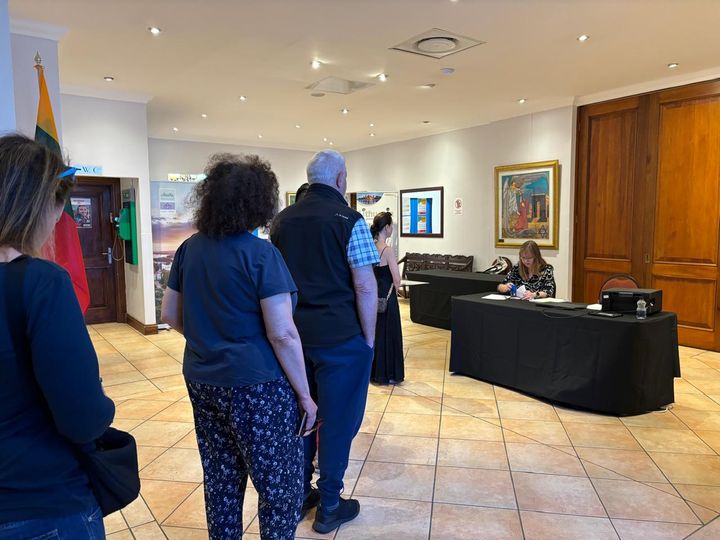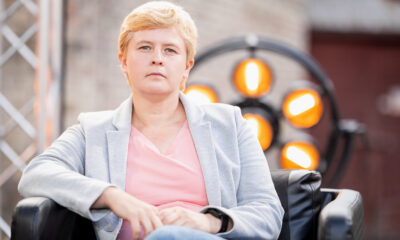
World

Failure to approve dual citizenship could impact Litvaks
Although close to 200 Litvaks – Jews of Lithuanian descent – voted in the Lithuanian presidential elections on 12 May at Beyachad in Johannesburg, the result was insufficient to secure the right for all Lithuanians to hold dual citizenship.
The referendum, which formed part of a multi-pronged election on Sunday, was unsuccessful in overturning Article 12 of the Constitution of Lithuania, which precludes dual citizenship, and results in only a small number of Lithuanians having the right to hold dual citizenship.
According to the Central Election Commission, 59.02% of voters took part in the referendum. The constitutional amendment on dual citizenship was supported by 73.94% of voters, but this wasn’t enough, because more than half of the population with the right to vote must support the proposal in order for it to be adopted. Less than half of eligible voters voted in favour of change.
This wasn’t the outcome that most Litvaks and many in the Lithuanian government wanted, because it means Lithuanians could potentially prevent Litvaks from holding dual citizenship when most Lithuanians don’t have this privilege. In the lead-up to the Lithuanian election, members of the Lithuanian government called on South Africans holding Lithuanian citizenship to vote in the upcoming election, saying its outcome could determine the future of dual passports.
Voting was essential, they said, because part of the election included a referendum on giving Lithuanian citizens the right to hold dual passports. As it stands, Jews of Lithuanian origin are among the few entitled to this. So, should dual citizenship not be accepted across the board, it may have a negative impact on those who hold dual passports and those trying to attain them.
There are believed to be between 3 000 and 7 000 South Africans holding Lithuanian citizenship.
“It’s crucial for South Africans holding Lithuanian passports to participate in the elections as their votes can influence decisions related to citizenship laws, including the possibility of allowing dual citizenship,” said the Lithuanian ambassador in South Africa, Rasa Jankauskaitė. “By exercising their right to vote, they can advocate for policies that have a direct impact on their status and rights.”
Diana Kopilevic, the chairperson of the Election Commission at the Lithuanian embassy in South Africa, said she was “very happy” with the turnout of voters with Lithuanian citizenship.
“We had one referendum quite a few years ago and the motion didn’t pass,” she said. “This year was the second try.”
Indeed, the 2019 referendum on Article 12 failed because votes in favour represented less than 40% of the total electorate. Changing Article 12 requires that more than half of all eligible voters vote in favour of the motion.
Lithuanian President Gitanas Nauseda, a 59-year-old former banker, and Prime Minister Ingrida Simonyte, a 49-year-old fiscal conservative with liberal views on social issues, will face off in the second round of the Baltic state’s presidential vote on 26 May after the incumbent failed to win an overall majority in the first round on Sunday.
Voters at Beyachad had access to information on all eight presidential candidates who appear on the ballot. Jankauskaitė said none of the candidates had direct connections to South Africa, “but they have the connection to foreign policy and relations, which covers all countries including Africa. The African continent becomes more and more important for European states.”
“Currently, the law on citizenship allows dual citizenship only in exceptional cases, for those whose ancestors left Lithuania before the restoration independence in 1990, but still had Lithuanian citizenship in 1940,” said the ambassador.
The changes to the Citizenship Law of Lithuania in 2022, which was supported 100% during its parliamentary vote, were spearheaded to make the process of applying for citizenship reinstatement for South African Jews whose ancestors once held Lithuanian citizenship easier and simpler, and it removed unnecessary legal obstacles which had created much frustration and anger for South African Litvaks.
Litvak David Saks said recently, “Lithuania was the heartland of one of the greatest Jewish civilisations in the diaspora, and as a community largely of Litvak origin, South African Jewry have been able to build on that proud legacy. Since the downfall of communism, it has been possible, albeit to a modest extent, for people in our community to re-forge that connection. Allowing them to hold dual citizenship would obviously go a long way towards building on this in future.”
“Being a South African Jew of Lithuanian descent, I know our roots are important,” said Reeva Forman, another Lithuanian citizen. “To have dual citizenship for whatever reason reminds me of my roots and being able to have a say in an election that’s not in the country I live in but one that I consider to be my own is extremely important.”
It was back in June 2016 when the Lithuanian government made a promise to acknowledge Litvaks’ right to citizenship, which was for years denied to them and their descendants for bureaucratic reasons. These amendments guaranteed the right to citizenship to Jews who were forced to flee Lithuania between 1918 and 1940, and who were citizens prior to 1940. It also recognised their descendants right to citizenship, going back four generations.
Voting on Sunday was also held in Pretoria at the Lithuanian embassy, which also attracted scores of people.










